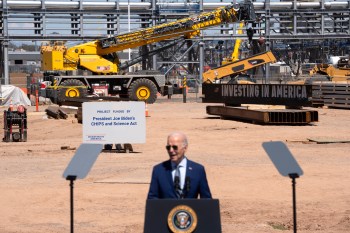
A U.S. manufacturing boost is causing anxiety abroad

American manufacturing is set to get a boost in the coming years, in large part thanks to two laws passed in 2022.
President Joe Biden signed into law two major bills to support a variety of industries, including the Inflation Reduction Act, dubbed the IRA, and the CHIPS and Science Act. They funnel massive amounts of money toward the renewable energy and semiconductor industries, respectively. While that may be good for American makers of things, it’s more complicated for U.S. allies abroad, who are likely to get the short end of the stick.
European countries have complained loudly that the measures aren’t necessarily fair — Ford recently announced that it would cut over 10% of its jobs in Europe to shift electric vehicle manufacturing to the States. The Biden administration is attempting to win over allies by arguing that the subsidies would reduce the world’s dependence on China, said Charlotte Howard, executive editor and New York bureau chief at The Economist.
“America is trying to make the case to its allies that by being protectionist — which these bills are — that it is good overall because it will reduce the world’s dependence on China as the source and controller of these really key supply chains,” Howard said in an interview with Marketplace’s Sabri Ben-Achour.
The following is an edited transcript of their conversation.
Sabri Ben-Achour: So there’s lots of money that’s going to be flowing to a number of different manufacturing industries in the coming years. If you are a company that is receiving funding from the Inflation Reduction Act or the CHIPS Act, how much of a boon is that going to actually be in the near future?
Charlotte Howard: It’s a really big deal for certain sectors. So if you look at chipmakers, for instance, the CHIPS Act, which was passed last year, has $52 billion. The Inflation Reduction Act has all kinds of money for different types of companies, both companies that are developing clean energy facilities as well as companies that produce clean energy equipment, whether it’s a solar panel or wind turbine. You have money for manufacturers of electric cars. And importantly, in the Inflation Reduction Act, those subsidies aren’t capped. So it really could be a huge amount of money that flows into some of these sectors.
Ben-Achour: American manufacturing is very high-end, it’s very productive. But the scope of manufacturing has been in decline for a good while now. Do you think that this money is enough to reverse that overall trend?
Howard: Well, it’s interesting because if you talk about manufacturing and its trajectory over the past few decades, there is a narrative, and rightly so, that it’s been on the decline because it has been on a decline as a share of the total economy. But actually, manufacturing output has risen. It’s the manufacturing as a share of the economy, and then manufacturing employment, that has really seen a precipitous decline. And the question is whether these bills might reverse that. So certainly for chipmaking, over the past two years, you’ve seen $200 billion invested across 16 states. And that’s going to be really transformative in those places. You think about Intel in Ohio, or Micron in upstate New York or TSMC, which is a Taiwanese company that’s investing in Arizona, that’s going to make a really big difference. You look at carmakers that are investing in electric cars and batteries. And there’s this corridor of investment that stretches from Michigan down through Ohio, Tennessee, Kentucky, Georgia. [Treasury Secretary] Janet Yellen likes to call it the Battery Belt that follows Interstate 75. There’s a ton of investment happening there. But it’s not really going to change necessarily the overall structure of America’s economy. It may — that’s what the Biden administration hopes to achieve. But it’s certainly not clear that it’s a done deal.
Ben-Achour: Well, it’s also, this money is premised on making America’s economy greener. How’s that going to happen? And will it happen?
Howard: Well, if you think about how many times politicians have tried and failed to pass climate legislation, it’s really notable that the Inflation Reduction Act went through. So in the past, basically, legislators tried to have sticks, so there’d be a cap-and-trade bill, people have debated a carbon tax. The Inflation Reduction Act includes no sticks, it’s only carrots. So there’s tons of money available to try to incentivize the production of green energy and green manufacturing. And the latter piece of that — green manufacturing — was really important to getting this bill passed because it was the promise of these jobs that helped win support from the likes of Joe Manchin, who’s a West Virginia senator whose vote was crucial to the passage of this law. So this law is kind of a complicated way to try to go about decarbonizing America. But it proved to be the only politically viable option that American politicians have yet come up with. And so I think on those terms, it’s absolutely a victory for Democrats and a victory for those who were trying to advance some kind of climate legislation through Washington.
Ben-Achour: Pouring all this money into U.S. manufacturing has infuriated some allies in Europe, Korea, for example. And these are the same allies who the U.S. is supposed to be getting on board to counter Chinese industrial policy. How does U.S. industrial policy, which is what this basically is, how does that affect those relationships?
Howard: Well, it’s a really interesting question because what you had before was a global economic system that really prioritized efficiency. So people designed supply chains to try to be efficient. And the result of that, paired with China’s own really aggressive industrial policy to promote its own industries, were that a couple of really key supply chains became centered in China, or in Taiwan, which America sees as risky because of the threat of a Chinese invasion of Taiwan. In the case of chipmaking, this wouldn’t have a real impact, knock-on effect for American security. And so America is trying to make the case to its allies that by being protectionist — which these bills are — that it is good overall because it will reduce the world’s dependence on China as the source and controller of these really key supply chains. Now for a politician in Europe, they worry about this giant sucking sound of all the investment crossing the Atlantic and going within America’s borders rather than a company choosing to build a battery factory in Europe, for instance. But America and the Biden administration is really trying to make the case that, yes, these are subsidies that are going to help move investment within America, but overall, nonetheless, that will be a good thing for the world.
Ben-Achour: Yeah. Is the world buying that?
Howard: I mean, if you look into the comments that have been made by the likes of Ursula von der Leyen, who’s the head of the European Commission, clearly, they’re skeptical of that argument. But what you’re going to see, I think, increasingly, is more governments — to the extent that their budgets allow it — pouring lots of money into incentivizing private sector activity. So if you think, 20 years ago, about the speech that Bill Clinton made when he was arguing for China’s acceptance into the World Trade Organization, there was this idea that China becoming part of the global economy in an integrated manner would help advance shared prosperity, that it would help open China and bring a sort of broader, closer cooperation between China and the rest of the world, politically and economically. What you have now is a situation that’s really far in the other direction, where those in the West increasingly see that economic integration as one that leaves them vulnerable. They’re increasingly trying to protect themselves against dependence on China through these subsidies. And so rather than China adopting the economic policies of the West, you see the West adopting the economic policies of China, so more state intervention into the private sector, not of course, to the extent that China does, but that’s the trend.
Ben-Achour: Where do we go from here? You know, this deluge of funding, how long is it going to last? And would it survive future administrations too?
Howard: Well, one thing I think is really interesting about the distribution of this money is a lot of it is going to go to red states. So the CHIPS Act did have bipartisan support because there are Republicans who see it as beneficial to be tough on China. It was very explicitly an anti-China bill. The Inflation Reduction Act had no Republican support. Nevertheless, Republican states benefit. So you saw in December, for instance, a big announcement of a hydrogen investment in Texas that the Republican governor there lauded. He didn’t, of course, cite the Inflation Reduction Act as the reason that investment was being made, but nonetheless, it was. There’s going to be a lot of investment across the middle of the country in wind farms, in transmission. Ohio, which is a Republican-led state, has this big investment from Intel for chipmaking. So one of the things that I think may protect it against the usual backlash that you might see from a Republican administration, should Republicans gain control of the White House, is that this money is really spread in a way that benefits Republican constituents.
There’s a lot happening in the world. Through it all, Marketplace is here for you.
You rely on Marketplace to break down the world’s events and tell you how it affects you in a fact-based, approachable way. We rely on your financial support to keep making that possible.
Your donation today powers the independent journalism that you rely on. For just $5/month, you can help sustain Marketplace so we can keep reporting on the things that matter to you.

















